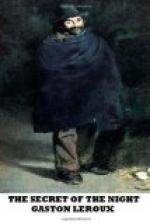Matrena Petrovna now threw herself out onto the balcony, crying in Russian, “Shoot! Shoot!” In just that moment the man was hesitating whether to risk the jump and perhaps break his neck, or descend less rapidly by the gutter-pipe. A policeman fired and missed him, and the man, after firing back and wounding the policeman, disappeared. It was still too far from dawn for them to see clearly what happened below, where the barking of Brownings alone was heard. And there could be nothing more sinister than the revolver-shots unaccompanied by cries in the mists of the morning. The man, before he disappeared, had had only time by a quick kick to throw down one of the two ladders which had been used by the police in climbing; down the other one all the police in a bunch, even to the wounded one, went sliding, falling, rising, running after the shadow which fled still, discharging the Browning steadily; other shadows rose from the river-bank, hovering in the mist. Suddenly Koupniane’s voice was heard shouting orders, calling upon his agents to take the quarry alive or dead. From the balcony Matrena Petrovna cried out also, like a savage, and Rouletabille tried in vain to keep her quiet. She was delirious at the thought “The Other” might escape yet. She fired a revolver, she also, into the group, not knowing whom she might wound. Rouletabille grabbed her arm and as she turned on him angrily she observed Natacha, who, leaning until she almost fell over the balcony, her lips trembling with delirious utterance, followed as well as she could the progress of the struggle, trying to understand what happened below, under the trees, near the Neva, where the tumult by now extended. Matrena Petrovna pulled her back by the arms. Then she took her by the neck and threw her into the drawing-room in a heap. When she had almost strangled her step-daughter, Matrena Petrovna saw that the general was there. He appeared in the pale glimmerings of dawn like a specter. By what miracle had Feodor Feodorovitch been able to descend the stairs and reach there? How had it been brought about? She saw him tremble with anger or with wretchedness under the folds of the soldier’s cape that floated about him. He demanded in a hoarse voice, “What is it?”
Matrena Petrovna threw herself at his feet, made the orthodox sign of the Cross, as if she wished to summon God to witness, and then, pointing to Natacha, she denounced his daughter to her husband as she would have pointed her out to a judge.
“The one, Feodor Feodorovitch, who has wished more than once to assassinate you, and who this night has opened the datcha to your assassin is your daughter.”
The general held himself up by his two hands against the wall, and, looking at Matrena and Natacha, who now were both upon the floor before him like suppliants, he said to Matrena:
“It is you who assassinate me.”




